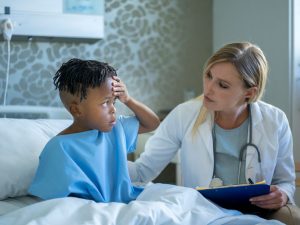Reviewed by Abbie Jacobs, RN, BSN
Nurses have always been on the front lines to bring aid when disasters strike, often at substantial risk to their own lives. Right behind first responders, nurses are often among the first to show up. The Red Cross relies on more than 20,000 volunteer nurses and other healthcare professionals to aid in disaster responses worldwide… and, as most nurses know, the American branch of that venerable society was founded in 1881 by a nurse, Clara Barton, and continued to grow under her leadership for the next 23 years.
With the specter of global climate change looming, the world is looking down the barrel of even more potentially catastrophic natural disasters. Climate factors are driving increases in wildfires, hurricanes, and drought conditions, while the Centers for Disease Control have tied climate change to new health threats ranging from air pollution to disease to food security challenges.
And natural disasters aren’t the only large scale problems resulting from climate change; UNESCO identifies five different climate-driven factors that are likely to create rising conflictbetween and within nation-states in the coming years, and a UN report published in 2015 offers evidence that drought conditions are part of what sparked the devastating civil war in that country.
The Evolving Role of Nurse Practitioners in Times of Disaster
 Barton’s original inspiration for lending aid was sparked in the midst of the American Civil War, but that was just the beginning. Barton and other nurses continued to offer vital medical care in the midst of disasters around the world, from floods in Ohio to hurricanes in Texas to battlefields in Turkey.
Barton’s original inspiration for lending aid was sparked in the midst of the American Civil War, but that was just the beginning. Barton and other nurses continued to offer vital medical care in the midst of disasters around the world, from floods in Ohio to hurricanes in Texas to battlefields in Turkey.
The distinguishing feature of nursing practice has always been a focus on the holistic and humanitarian treatment of patients. This sort of philosophy is an important one in disaster response, where the immediate clinical needs of victims frequently overlap with psychological and humanitarian issues… lack of access to food, shelter, and hygiene.
The very nature of nursing means that nurses are often better prepared than other medical professionals to handle the multitude of issues that arise in the chaos that natural disasters leave in their wake. When you’ve done everything from attending to the personal hygiene of incapacitated adult patients to calculating drug dosages, you’ve got a kind of composure and perspective that most healthcare professionals just can’t match.
Nurse Practitioners Can Up The Disaster Response Game Even Further
Nurse practitioners bring an even more advanced set of capabilities and competencies to disaster response, many of which have not been fully explored.
The ICN and WHO identify 10 disaster nursing competencies:
- Risk reduction, disease prevention, and health promotion
- Policy development and planning
- Ethical practice, legal practice, and accountability
- Communication and information sharing
- Education and preparedness
- Care of communities
- Care of individuals and families
- Psychological care
- Care of vulnerable and special needs populations
- Long-term care needs
Unsurprisingly, many of these competencies dovetail neatly with many nurse practitioner core competencies. But NPs also bring advanced clinical skills to the table, along with other qualities that emerge from their more intensive training and practice responsibilities. The National Panel for APRN Emergency Preparedness and all Hazards Response Education notes a number of competencies where NPs can add to or extend those core capabilities:
Leadership – With additional education and expertise, not to mention day-to-day experience in building and leading care teams, APRNs are ideally suited to taking on nursing leadership roles in disaster scenarios.
Technology and information literacy – APRNs often have advanced research and technical skills, which assists with complex decision making during disasters.
Policy – Ahead of disasters, APRNs can use their understanding of the relationship between policy and practice to assist in planning and preparation.
Health delivery system – A broad, interprofessional care team experience is one many APRNs enjoy in their standard practice, and pays dividends when disaster strikes and coordination between different healthcare and first responder entities is paramount.
Independent practice – Finally, APRNs have the right skills and authority to practice independently and react quickly in a changing environment, which can make them the ideally suited to offer emergency assistance when resources are strained in disaster scenarios.
To some extent, those competencies are simply a natural extension of the additional training and education that APRNs receive in the normal course of qualifying for the role. On the other hand, disasters bring a new and unique set of challenges, and specialized training should be adopted in both the basic education required for APRN licensure and in the course of regular continuing education.
Building Emergency Preparedness into APRN Education and Practice
In the past, The National Panel made suggestions for ways to improve nursing education with regard to emergency preparedness. Their wide-ranging suggestions covered everything from ways to integrate triage and care rationing training into existing ethics courses, to including things like diagnostic training for bubonic plague and chemical agents into dermatological courses.
Those suggestions for integrating emergency response training with current APRN education points to the importance of tying emergency response skills in with more common nursing duties rather than seeing them as separate. Even though you’ll likely never see a victim of the bubonic plague walk into the clinic, APRNs perform dermatological screens all the time. If the day should ever come where the plague re-emerges, having tied it to those basic diagnostic skills will make APRNs that much more capable of adapting to the situation.
It’s also possible to specialize in disaster management and response. As of 2017, the American Nurses Credentialing Center began offering the National Healthcare Disaster Preparedness (NHDP-BC) certification, an interprofessional, exam-based credential that certifies a wide variety of specific disaster-oriented skills.
Preparing For The Next Disaster Starts Today
 Whether it’s going out and putting the time into earning an NHDP-BC, or volunteering for the Red Cross or other organization that offers training or experience in disaster preparedness, both individual APRNs and healthcare systems can start preparing for disaster responses right now.
Whether it’s going out and putting the time into earning an NHDP-BC, or volunteering for the Red Cross or other organization that offers training or experience in disaster preparedness, both individual APRNs and healthcare systems can start preparing for disaster responses right now.
Involving nurse practitioners in disaster response drills is important for both hospitals and first responder organizations. In emergencies, many individuals and organizations that may not normally work closely with one another are thrown together and expected to perform miracles. It’s a laudable, but unrealistic, expectation without some previous interactions and plenty of practice.
APRNs should make every effort to engage with local disaster planning authorities to expand the scope of their own training and improve their capabilities. The time to engage in that kind of training is long before disasters occur. And since disasters can strike when you least expect, that means now is the best time to get started.



